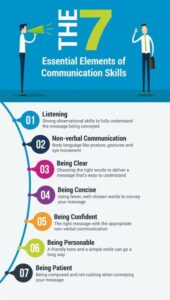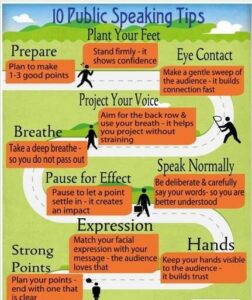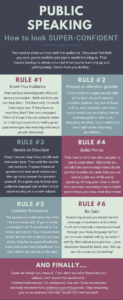A Compact Guide To Improving Communication Skills And Public Speaking
Imagine this. You’re standing in front of a packed auditorium, the spotlight illuminating your face as expectant eyes bore into you. Your heart races, and beads of sweat form on your forehead. It’s your moment to shine, to captivate this audience with your words. But there’s one problem, your mind goes blank, and the words get stuck in your throat. You’ve lost all of your communication skills and you’re not sure where to turn.
Public speaking.
Just the thought of it can send shivers down the spines of even the most confident individuals.
Yet, in the world of business, it’s a skill that can make or break your success.
And what’s the secret weapon that unlocks the door to effective public speaking? Great communication skills.
In this compact guide, we’ll delve into the fascinating realm of communication skills and unravel their profound impact on public speaking.
From the basics of communication to mastering the art of captivating an audience. We’ll equip you with the tools and techniques necessary to conquer any stage and leave a lasting impression.
So, fasten your seatbelts and get ready to embark on a journey of self-discovery and transformation.
Join us as we explore the power of effective communication, unravel the secrets of public speaking success, and unveil practical strategies to enhance your skills. Get ready to unleash your inner orator, command attention, and make your mark on every stage you step upon.
The spotlight is waiting for you, and it’s time to shine.
Are you ready?
Why Having Great Communication Skills Is So Important
Communication, in its essence, is the lifeblood of human interaction.
It’s the bridge that connects us, allowing ideas, emotions, and information to flow seamlessly between people.
But why are great communication skills so vital, especially for business owners? Let’s explore the profound significance they hold.
Building Relationships and Resolving Conflicts
At the heart of every successful business lies a web of relationships. With clients, employees, partners, and stakeholders.
Effective communication acts as a catalyst for building and nurturing these relationships. When you can convey your thoughts clearly, listen actively, and empathise with others, you forge connections that foster trust, loyalty, and long-term collaborations.
Communication skills become indispensable when navigating conflicts and disagreements too.
By expressing your perspective assertively yet respectfully, you can find common ground, negotiate win-win solutions, and preserve harmonious working relationships.
Strong communication skills enable you to defuse tension, promote understanding, and build bridges where there once were walls.
Enhancing Collaboration and Teamwork
In today’s interconnected business landscape, teamwork and collaboration are paramount to success.
But they cannot thrive without effective communication as their foundation.
Clear and concise communication ensures that everyone is aligned with goals, responsibilities, and expectations, minimising misunderstandings and enhancing productivity.
When team members can articulate their ideas, actively listen to one another, and provide constructive feedback, a synergy emerges. Propelling the team towards innovation and excellence.
Effective communication within teams fosters a supportive and inclusive environment. Where ideas can be freely shared, collective intelligence can flourish, and remarkable achievements can be realised.
Impact on Business Growth and Success
The ripple effects of good communication extend far beyond individual relationships and teamwork.
They permeate the very fabric of a business, influencing its growth and overall success.
With great communication skills, you can articulate your business vision, mission, and values with clarity, inspiring your team and attracting clients and investors who resonate with your message.
Furthermore, effective communication plays a pivotal role in customer satisfaction and retention.
When you can understand your customers’ needs, respond to their inquiries promptly, and communicate the value of your products or services persuasively, you create a customer experience that fosters loyalty and drives business growth.
Great communication skills act as the cornerstone of success for business owners.
They enable you to build strong relationships, resolve conflicts amicably, foster collaboration and teamwork, and fuel business growth.
By honing your communication skills, you unlock the power to connect, influence, and leave a lasting impact in the competitive business landscape.
Embrace the journey of improving your communication skills, and watch as the doors of opportunity swing open before you.

Why should you improve your communication skills?
What Are The Basics?
Effective communication encompasses a range of skills that work harmoniously to ensure clarity, understanding, and connection. Let’s explore the fundamental building blocks of communication that every business owner should master.
1. Active Listening:
At the heart of communication lies the ability to listen actively. It involves giving your undivided attention to the speaker, seeking to understand their perspective, and responding thoughtfully. Active listening goes beyond hearing words. It involves interpreting nonverbal cues, such as facial expressions and body language. Then you can begin to grasp the underlying message. By truly listening, you show respect, build trust, and create a solid foundation for meaningful conversations.
2. Verbal Communication:
Clear and concise verbal expression is crucial for effective communication. It means conveying your thoughts, ideas, and information in a manner that is easily understood by others. Organise your ideas coherently, choose words wisely, and speak with confidence and conviction. Keep your sentences short and impactful, ensuring that your message resonates with your audience. Remember, powerful verbal communication paints vivid pictures and leaves a lasting imprint.
3. Nonverbal Communication:
Sometimes, the unspoken speaks louder than words. Nonverbal communication encompasses gestures, facial expressions, posture, and tone of voice. It adds depth and nuance to your message, allowing you to convey emotions, intentions, and emphasis. Master the art of body language, ensuring that your gestures align with your words. Maintain eye contact, use appropriate facial expressions, and project confidence through your posture. By harnessing nonverbal cues effectively, you can enhance understanding and establish rapport with others.
4. Written Communication:
In today’s digital age, the importance of well-crafted written communication cannot be overstated. Whether it’s an email, a report, or a social media post, written content reflects your professionalism and attention to detail. Structure your writing logically, ensuring that your message flows smoothly. Use concise and engaging language to captivate your readers and convey your ideas effectively. Polish your grammar and spelling, proofread meticulously, and ensure your written communication leaves a lasting impression.
Mastering these basic communication skills lays the foundation for effective interaction.
As a business owner, honing these skills will allow you to engage with people authentically. And present your ideas persuasively. It will even help you connect with your audience on multiple levels.
Embrace the power of active listening, develop your verbal and nonverbal communication prowess, and sharpen your written communication abilities.
By doing so, you unlock the gateway to seamless and impactful communication.

Communication Skills
How Can I Use Communication Skills To Become Great At Public Speaking
Public speaking has the power to inspire, influence, and captivate an audience. It’s an art that can be mastered through the effective use of communication skills. If you’re eager to become a remarkable public speaker, here’s how you can leverage your communication prowess:
Developing Confidence and Presence on Stage
Confidence is key when stepping onto the stage. Cultivate a strong belief in your abilities and embrace a positive mindset. Stand tall, maintain eye contact with your audience, and project your voice with clarity and conviction. Use techniques like deep breathing to calm your nerves and exude an aura of self-assurance. By developing confidence and presence, you’ll command attention and establish a connection with your audience from the moment you take the stage.
Crafting a Compelling and Structured Speech or Presentation
Effective public speaking requires careful planning and organisation. Craft your speech or presentation with a clear structure in mind. Start by understanding what the main message that you want the audience to take away is.
Begin with a captivating introduction that grabs the audience’s attention and sets the tone for your message.
Develop your main points, using logical transitions to guide the flow of your speech.
Conclude with a memorable ending that reinforces your key message and leaves a lasting impact. By structuring your content effectively, you provide a framework for your audience to follow and retain the information you share.
Engaging the Audience through Storytelling and Relatable Examples
A great public speaker knows the power of storytelling.
Weave narratives into your speech that resonate with your audience’s experiences and emotions. Share personal anecdotes, case studies, or real-life examples that illustrate your main points.
By incorporating relatable stories, you create an emotional connection, making your message more memorable and impactful. Engage your audience’s imagination and invite them to be part of the journey you’re presenting.
Using Visual Aids Effectively to Enhance the Message
Visual aids are powerful tools that can elevate your public speaking performance. Use slides, videos, or props that complement and enhance your message.
Keep visual aids simple, uncluttered, and visually appealing.
Use them to highlight key points, convey data, or create visual metaphors that reinforce your spoken words.
Visual aids serve as powerful visual cues, capturing and sustaining your audience’s attention while reinforcing the message you’re delivering.
By leveraging your communication skills in public speaking, you can become a captivating and influential speaker.
Develop confidence and stage presence, craft compelling speeches, engage your audience through storytelling, and use visual aids strategically.
Embrace the opportunity to share your ideas, inspire change, and leave a lasting impact on every stage you grace.
With the power of effective communication, you can become an extraordinary public speaker, captivating the hearts and minds of your audience.

Communication Skills – 10 Public Speaking Tips
Public Speaking: The Basics
Public speaking is both an art and a skill that can be honed with practice and understanding. To deliver a compelling and impactful speech, it’s essential to master the basics. Here are the key elements to consider:
Understanding Your Audience and Tailoring Your Message
A successful public speaker knows their audience inside out. Before stepping onto the stage, take the time to research and understand who you’ll be addressing. Consider their demographics, interests, and needs.
Then tailor your message accordingly to ensure it resonates with your audience and meets their expectations. By understanding your audience, you can connect on a deeper level and deliver a speech that engages and captivates their attention.
Opening with a Strong Introduction to Capture Attention
First impressions matter, and that’s particularly true in public speaking.
Begin your speech with a compelling introduction that grabs your audience’s attention from the start.
You can use a thought-provoking question, a surprising fact, a captivating story, or a powerful quote.
Whatever approach you choose, make sure it sets the tone for your speech and entices your listeners to lean in and listen attentively.
Organizing Your Speech with a Clear Beginning, Middle, and End
A well-organised speech is easier to follow and comprehend.
Structure your speech with a clear beginning, middle, and end.
A clear structure helps your audience follow along and retain the information you share.
Concluding with a Memorable and Impactful Ending
The conclusion of your speech is your final opportunity to leave a lasting impression.
Craft a memorable and impactful ending that reinforces your key message and resonates with your audience. You can summarise your main points, share a personal anecdote, call the audience to action, or provide a thought-provoking takeaway.
Leave your listeners with a sense of inspiration, empowerment, or reflection.
By ending your speech on a strong note, you ensure that your message lingers in their minds long after you’ve left the stage.
By mastering the basics of public speaking, you lay a solid foundation for delivering engaging and influential speeches. Understand your audience, captivate them with a strong introduction, structure your speech coherently, and leave a memorable impact with your conclusion.
Practicing and Rehearsing
Public speaking, like any skill, requires practice to master. The more you practice, the more confident and polished your delivery becomes.
The Importance of Practice for Honing Public Speaking Skills
Practice is the backbone of public speaking proficiency.
It allows you to refine your delivery, fine-tune your message, and build confidence.
Regular practice helps you become familiar with your speech, enabling you to speak more naturally and fluidly. It also helps to identify areas that need improvement, whether it’s pacing, gestures, or vocal variety.
Through practice, you gain the necessary skills and muscle memory to deliver your speech with impact.
Strategies for Rehearsing Effectively, such as Recording and Reviewing Performances
Rehearsing effectively involves more than simply repeating your speech. It’s about actively engaging with your content and refining your delivery.
One powerful strategy is to record your performances.
Use a smartphone or video camera to capture yourself delivering the speech.
Watch the recording and critically assess your body language, vocal tone, and overall presence. Take note of areas where you can improve and make adjustments in subsequent rehearsals. This process allows you to polish your delivery and make impactful changes.
Seeking Opportunities to Speak in Public and Gain Experience
Practice goes beyond rehearsing alone in front of a mirror.
It’s essential to seek opportunities to speak in public and gain real-life experience.
Look for local networking events, workshops, or Toastmasters clubs where you can present your speech in a supportive environment. Embrace opportunities to speak at business meetings, conferences, or community events.
Each experience adds to your repertoire, helping you refine your delivery, connect with diverse audiences, and become more comfortable in front of others.
Remember, practice and rehearsal are ongoing processes.
Continuously seek opportunities to refine your skills, experiment with different techniques, and learn from each speaking engagement.
Embrace constructive feedback, both from others and yourself, and make adjustments accordingly. With each practice session and speaking opportunity, you grow and evolve as a public speaker.

Communication Skills – 10 Public Speaking Tips
Seeking Feedback and Continuous Improvement
In the pursuit of becoming a highly skilled public speaker, seeking feedback and continuously improving is paramount.
Feedback is a valuable tool for self-improvement.
Embrace constructive feedback from trusted sources, such as colleagues, mentors, or audience members.
Listen attentively to their observations and suggestions, focusing on areas where you can enhance your delivery, content, or stage presence.
Be open to different perspectives and use feedback as a catalyst for growth. By actively seeking and embracing feedback, you’ll accelerate your progress as a public speaker.
Self-reflection is also a powerful practice that allows you to identify strengths and areas for improvement.
Take time after each speaking engagement to reflect on your performance.
What went well?
What could have been better?
Analyse your delivery, body language, and overall impact. Consider how you engaged with the audience and delivered your message.
Self-reflection helps you gain self-awareness and pinpoint specific areas where you can focus your efforts for improvement.
Leverage the guidance and expertise of mentors, coaches, and training programmes.
Seek out experienced speakers who can provide guidance, share best practices, and offer valuable insights. A mentor or coach can provide personalised feedback and support, helping you navigate challenges and refine your skills.
Additionally, consider participating in public speaking training programs or workshops. These resources provide structured learning experiences, practical exercises, and a supportive environment to enhance your speaking abilities.
Remember, improvement is a continuous journey.
Regularly assess your progress, set specific goals, and take deliberate steps to advance your public speaking skills.
Celebrate your successes along the way and acknowledge that growth requires time and effort. By seeking feedback, engaging in self-reflection, and using resources, you pave the way for continuous improvement as a confident and impactful public speaker.

Managing Nervousness During Presentations
Public speaking can evoke feelings of nervousness and anxiety in even the most seasoned speakers. However, by employing effective techniques, you can manage and even harness those nerves to deliver a confident and impactful presentation. Here are some strategies for managing nervousness during presentations:
- Understanding the Common Causes of Nervousness: Nervousness often stems from the fear of being judged or making mistakes in front of an audience. It’s a natural response to the pressure of public speaking. Recognise that you’re not alone in feeling nervous and that it’s a common experience shared by many speakers. Understanding the underlying causes of nervousness can help you address them more effectively.
- Techniques for Managing Anxiety, Including Deep Breathing and Visualisation: Deep breathing is a powerful technique for managing anxiety. Prior to your presentation, take a few moments to engage in deep, slow breaths. Inhale deeply through your nose, hold for a few seconds, and exhale slowly through your mouth. This helps calm your nervous system and reduces tension. Visualisation is another effective tool. Imagine yourself delivering a successful and engaging presentation, visualising positive outcomes and feelings of confidence. This technique helps shift your focus from anxiety to a more positive and empowering mindset.
- Practicing Relaxation Exercises Before and During Presentations: In addition to deep breathing and visualisation, integrating relaxation exercises can help manage nervousness. These exercises can include gentle stretching, shoulder rolls, or progressive muscle relaxation. Find techniques that work best for you to release tension and promote a sense of calm. Practice these exercises before your presentation and even during breaks if needed. They provide a moment of respite and help you maintain a steady composure.
Summary
Honing your communication skills and becoming adept at public speaking is crucial for business owners.
The ability to articulate ideas, engage with others, and deliver persuasive presentations directly impacts your success in the business world.
By investing time and effort into improving these skills, you position yourself as a confident and influential leader.
Remember, communication skills and public speaking are not innate talents, but learned abilities that can be continuously developed.
Embrace the journey of growth and improvement, using the strategies and techniques discussed in this article. Seek opportunities to practice, gather feedback, and learn from experienced speakers. Embrace nervousness as a natural response and employ relaxation techniques to manage it effectively.
At our business coaching company, we understand the importance of communication skills and public speaking for small business owners. We offer comprehensive coaching services tailored to your specific needs, helping you enhance your communication abilities and achieve your business goals. Explore our services and reach out to us to embark on a transformative journey of growth and success.
Invest in your communication skills and public speaking abilities, and witness the profound impact they have on your business and professional life.





